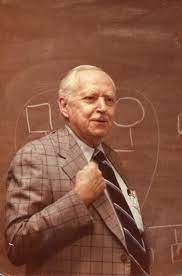 The following is a brief introduction to Murray Bowen and Bowen family systems theory and therapy.
The following is a brief introduction to Murray Bowen and Bowen family systems theory and therapy.
Murray Bowen, MD, (1913-1990) developed a comprehensive theory of human family functioning that offers a framework to understand human behavior.
Bowen's perspective was:
-
Man is conceived as the most complex form of life that evolved from the lower forms and is intimately connected with all living things. The most important difference between man and the lower forms is his cerebral cortex and his ability to think and reason. Intellectual functioning is regarded as distinctly different from emotional functioning, which man shares with the lower forms. Emotional functioning includes the automatic forces that govern protoplasmic life. It includes the force that biology defines as instinct, reproduction, the automatic activity controlled by the automatic nervous system, subjective emotional and feeling states, and the forces that govern relationship systems. (304-305)
Bowen stated:
-
When it became possible to see the relationship patterns in families with schizophrenia, it was then possible to see less intense versions of the same
patterns in milder forms of emotional illness, as well as in normal people. (xiv)
The cornerstone of Bowen family systems theory is differentiation of self, a lifelong effort to become a more mature self. Working to understand family functioning across generations, an individual becomes more aware of automatic responses and patterns developed in their own family system, and more able to manage self and permit others to be themselves.
Bowen was known to ask, "What are you going to do with the hand you were dealt?"
The challenge is to work to be the best one can be.
For more information about Bowen family systems theory, go to Bowen Systems Theory Overview on the homepage.
Reference:
Murray Bowen. Family Therapy in Clinical Practice. Northvale, NJ: Jason Aronson, 1978.
